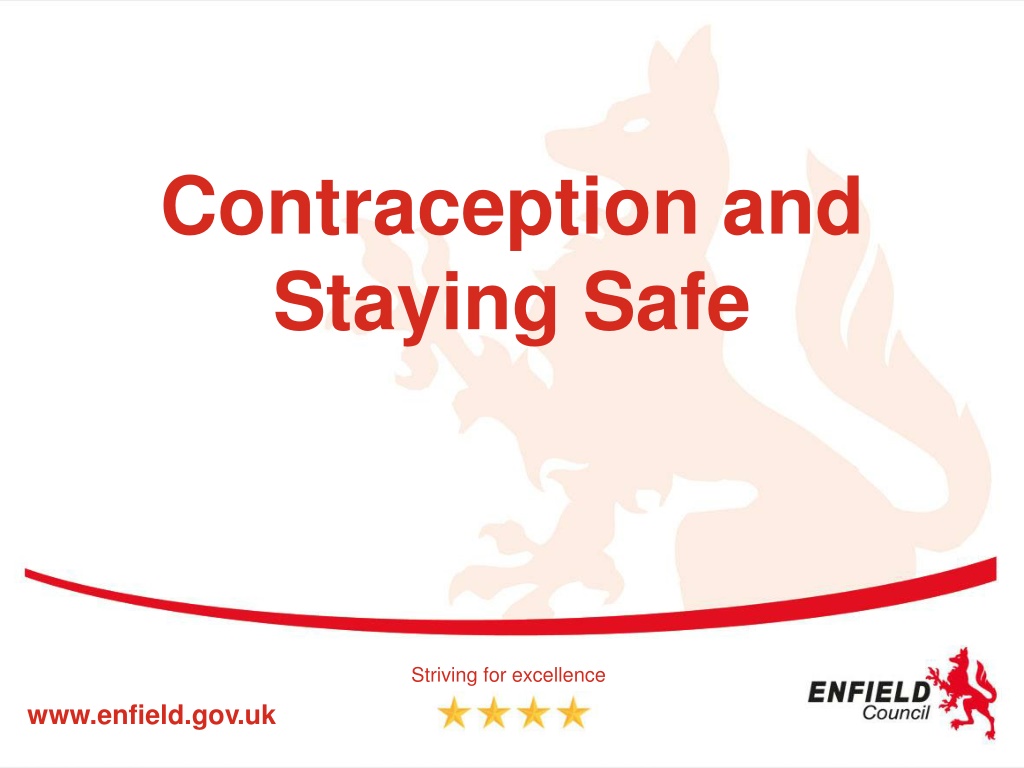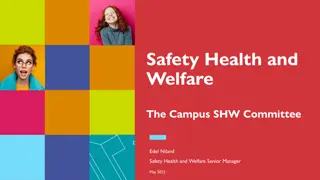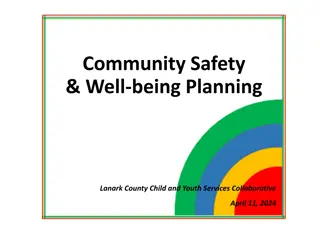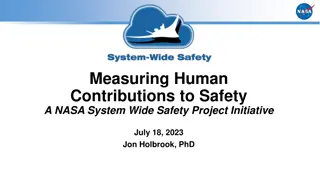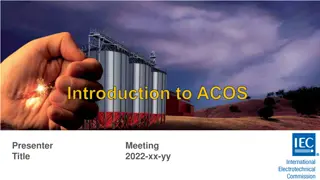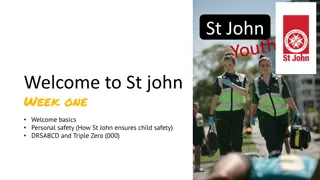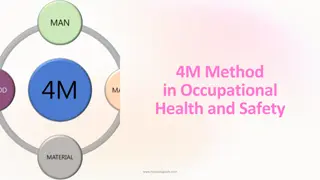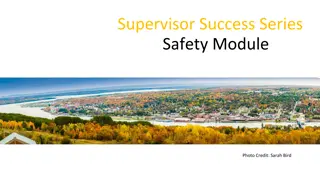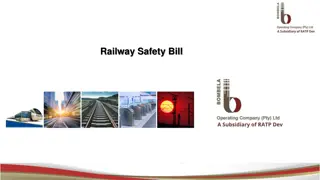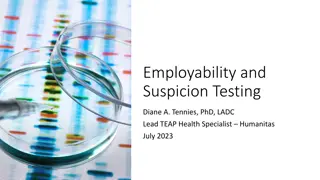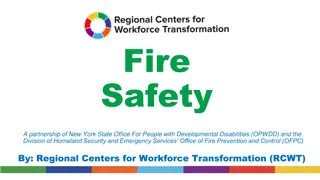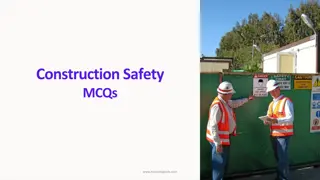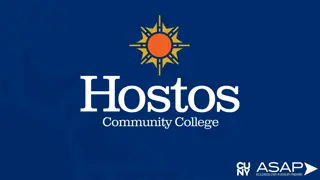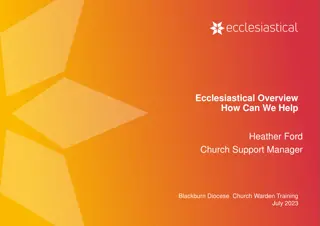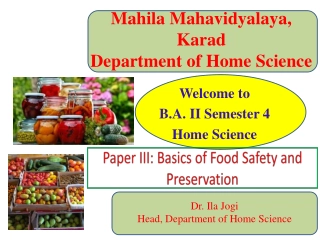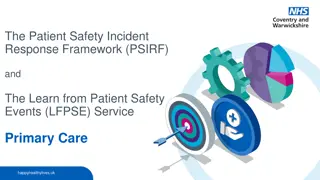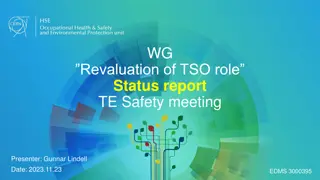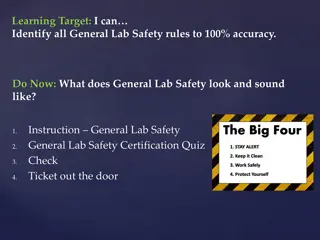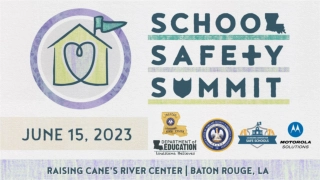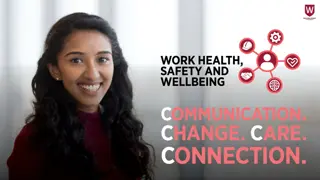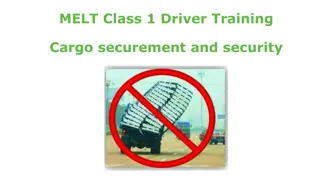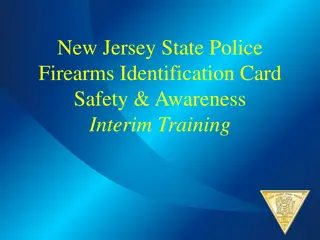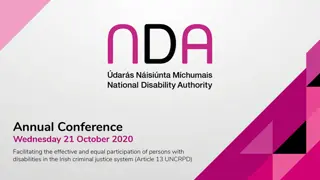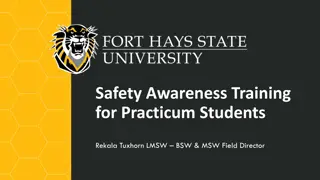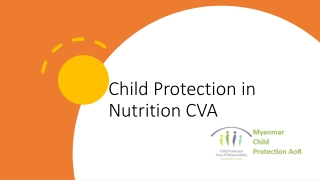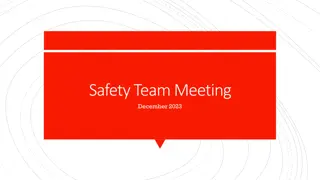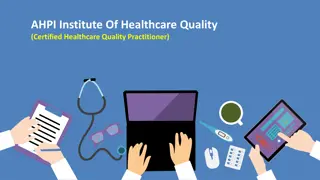Assisting in Ensuring Safety and Well-being Through Comprehensive Topics
This presentation covers important topics such as contraception, sexting, grooming, and more, aiming to educate and promote safety. Ground rules and strategies for creating a safe learning environment are discussed, along with icebreakers to encourage interaction. Participants are guided on how to set boundaries and engage in discussions respectfully.
Download Presentation
Please find below an Image/Link to download the presentation.
The content on the website is provided AS IS for your information and personal use only. It may not be sold, licensed, or shared on other websites without obtaining consent from the author. Download presentation by click this link. If you encounter any issues during the download, it is possible that the publisher has removed the file from their server.
Presentation Transcript
Contraception and Staying Safe Striving for excellence www.enfield.gov.uk
What well cover today Contraception & emergency hormonal contraception (morning after pill) Sexting Grooming Child sexual exploitation C-Card and clinic opening times
Disclaimer In this presentation, we will be discussing topics to do with staying safe including sexting, grooming, and sexual exploitation. If for any reason you would like to speak to someone further, please do let us know, and if you need a breather feel free to take a break outside.
Ground rules Respect your peers Listen when someone is speaking Turn off your mobiles and other devices Don t tell other people s stories Confidentiality Feel free to ask questions
How to set ground rules with young people Establish a safe space introduce the aims of the session and explain that for some people these can be challenging or sensitive topics to talk about. Explain the importance of creating a learning environment in which everyone feels safe and respected and able to share their views and listen to others. Ask participants to call out ideas and suggestions and write them on a board / flipchart. Or give each participant a post-it note and ask them to write one thing that they want everyone to do to create a learning environment in which they can participate. Ensure that your space is LGBT+ inclusive. Display the agreement. Refer back to the agreement each session of when you feel is appropriate.
Icebreakers, energisers and warm up activities Icebreakers, energisers and warm up activities encourage participants to have fun and interact with each other before the session start. Ideas for this are: Would you rather? We will do this next Cross the circle. Encourages participants to share view and experience with others in a way that feels safe to them. E.g. cross the circle if you Have a brother or sister Laughed out loud this morning Like the taste of marmite Have ever cried form being so happy Have lied Have argued with someone Have made a sexist comment yourself For more ideas go to https://insight.typepad.co.uk/insight/icebreakers_and_games/
Would you rather? Be invisible or be able to fly? Sit on a beach for a week or go to New York? Wear someone else's dirty underwear or use someone else's toothbrush? Know when you are going to die or how you are going to die? Only wash your hair once a year or brush your teeth once a year? Fall in love or win the lottery? Snog a complete stranger or lick your friends face? Give up your mobile phone or your best friend for a whole year? Lie in a bed of spiders or a bath of slugs? Always say out loud everything you are thinking or never be able to speak again? My son s question would you rather be in prison for 3 months or lockdown for 6 months.
Statutory RSHE in schools Relationships, Sex and Health Education (RSHE or PSHE) is now compulsory in schools DfE guidance can be found here Contraception what pupils should know by the end of secondary school Intimate and sexual relationships, including sexual health That all aspects of health can be affected by choices they make in sex and relationships, positively or negatively, e.g. physical, emotional, mental, sexual and reproductive health and wellbeing. The facts about the full range of contraceptive choices, efficacy and options available. The facts around pregnancy including miscarriage. That there are choices in relation to pregnancy (with medically and legally accurate, impartial information on all options, including keeping the baby, adoption, abortion and where to get further help). How to get further advice, including how and where to access confidential sexual and reproductive health advice and treatment.
Statutory RSHE in schools Sexting, Grooming, Child Sexual Exploitation what pupils should know by the end of secondary school Online and media Pupils should know Their rights, responsibilities and opportunities online, including that the same expectations of behaviour apply in all contexts, including online. About online risks, including that any material someone provides to another has the potential to be shared online and the difficulty of removing potentially compromising material placed online. Not to provide material to others that they would not want shared further and not to share personal material which is sent to them. What to do and where to get support to report material or manage issues online. The impact of viewing harmful content. How information and data is generated, collected, shared and used online. Being safe The concepts of, and laws relating to, sexual consent, sexual exploitation, abuse, grooming, coercion, harassment, rape, domestic abuse, forced marriage, honour-based violence and FGM and how these can affect current and future relationships How people can actively communicate and recognise consent from others, including sexual consent, and how and when consent can be withdrawn (in all contexts, including online).
Long Acting Reversible Contraception (LARC) Implant The implant is a method of LARC contraception. It is a matchstick sized rod of plastic inserted into the upper arm which releases progestogen - a hormone to prevent pregnancy. Lasts 3 years Over 99% effective Injection The injection releases the hormone progestogen which works to control your fertility. Injection every 8, 12 or 13 weeks 94% - over 99% effective
Long Acting Reversible Contraception (LARC) IUS (Intrauterine system) The IUS is a small T shaped plastic device that contains the hormone progestogen to control your fertility. The device needs to be fitted by a trained nurse or doctor. Lasts 3-5 years Over 99% effective IUD (Intrauterine device) The IUD is similar to the IUS but it does not release hormones, it releases copper into the womb. It can also stop a fertilised egg from implanting. The device needs to be fitted by a trained nurse or doctor. The IUD is the only form of LARC contraception which is non-hormonal. Lasts 5-10 years Over 99% effective
Hormonal Methods Combined Pill The combined pill is what is commonly known as the pill it gets its name because it contains two hormones; progestogen and oestrogen. Taken daily for three weeks, followed by a 7 day break 91%-99% effective. Progestogen-Only Pill (mini pill) Progestogen only pill, this is taken every day with no break. Taken daily. 91%-99% effective. Notice how methods of contraception become less reliable when they depend on people having to remember to take them.
Hormonal Methods Contraceptive vaginal ring The contraceptive vaginal ring is a soft, flexible, plastic ring that goes into the vagina. It releases the hormones oestrogen and progestogen into the bloodstream to prevent pregnancy by controlling your fertility. The vaginal ring is less common in the UK. Replaced every four weeks worn for three weeks, followed by a week off. 91%-99% effective. Contraceptive patch This is a 5cm by 5cm beige patch, applied to the skin like a plaster. It releases the hormones oestrogen and progestogen through the skin. This prevents pregnancy by controlling your fertility. Replaced once a week for three weeks, followed by one week off. 91%-99% effective.
Barrier Methods Barrier methods are the only way to prevent the spread of sexually transmitted infections as well as preventing pregnancy. Condoms Condoms are made of very thin latex (rubber) and are designed to cover the penis in order to stop skin to skin contact and from sperm entering the vagina during ejaculation. Single use. 82%-98% effective. Internal or Female Condom (Femidom) Female condoms are less common than condoms but it is good for people to be aware that they do exist. Instead of covering the penis they inserted into the vagina. Single use. 79%-85% effective.
Emergency Hormonal Contraception (The Morning After Pill) Emergency contraceptive or the morning after pill works by delaying ovulation (release of an egg) and by thickening the mucus lining at the cervix therefore preventing sperm getting in to the uterus. Levonelle (Levonorgestrel) can be taken up to 72 hours after unprotected sex, and is more effective the earlier that you take it. Young people in Enfield can access emergency hormonal contraception for free at sexual health clinics and in certain pharmacies. Ella One (Ulipristral Acetate) can be taken up to 120 hours (5 days) after unprotected sex. It is free at sexual health clinics, or at pharmacies with a prescription from your GP. The IUD coil is made from plastic and copper. It stops fertilisation, and prevents fertilised eggs from implanting in the womb and can be fitted up to 120 hours after unprotected sex, or 5 days after the earliest time you could have ovulated. It is free from sexual health clinics. You can continue using it as your regular form of contraception once fitted. You can also access this in A&E when sexual health clinics and pharmacies may be closed.
Emergency Hormonal Contraception (The Morning After Pill) Quiz myths and facts The morning after pill can only be taken the morning after? The morning after pill is not an accurate name and young people should be encouraged to call it emergency contraception. The pill can actually be taken up to five days after unprotected sex, depending on which type of pill you take. The sooner you take the morning after pill, the greater the chances of avoiding pregnancy. Emergency contraception is an abortion? Many people do not like the idea of taking emergency contraception because they think it induces an abortion. It does not, it prevents pregnancy. Taking emergency contraception prevents pregnancy for the rest of your cycle? Taking the emergency contraceptive pill does not protect you from pregnancy later on in your cycle. If you have sex again before you have your period, you would need to use another form of contraception. Emergency contraception is not designed to be used as a regular form of contraception but can be used more than once in a cycle if necessary. It will still work if you're sick afterwards? If you are sick within three hours of taking emergency contraception please seek medical advice as you will need a further dose or a different method of emergency contraception.
Condom Excuses I only use condoms if I think someone has an STI Condoms spoil sex for me Why bother? STIs can be cured with antibiotics Sex feels so much better without it s worth the risk No one would have unprotected sex if they had an STI! We use another method, so we don t need to But condoms make sex crap! It s SO hard to stop in the heat of the moment I m not a dirty person, why should I use condoms? I forget when I m drunk or high I can t afford condoms!
Activities and resources to teach about contraception BISH a website for over 14 s a guide to love, sex and you! https://www.bishuk.com/ Book with 200+ activities for educators working with young people - 30.63 https://www.amazon.co.uk/Relationships-Education-Lesson-Ideas- Century/dp/0815393636 Brook a website for under 25s - sexual health and wellbeing guide https://www.brook.org.uk/topics/contraception/ Brook free training courses online https://learn.brook.org.uk/ Childline https://www.childline.org.uk/info-advice/friends-relationships-sex/sex- relationships/contraception-safe-sex/ Sexwise (formally FPA and now run by Public Health) https://www.sexwise.org.uk/contraception Padlet with links to a lot of resources https://padlet.com/sharondavies1/sx3v2f1dc4tjjo11
What is sexting? Sexting means sending indecent images / nudes (pictures and/or videos) of yourself or others or sending sexually explicit messages. Sexting can happen on any electronic device that allows sharing of media and messages including smartphones, tablets, laptops or mobiles. Requesting, taking, sending or possessing sexual messages, images or videos of anyone under 18 is illegal even if the people in it agreed to it. For under 18s, it is classed as a form of child abuse or child sexual exploitation.
Why young people send nudes? Peer pressure Feeling pressured to sext as a way of proving their sexuality As a result of harassment, threats or blackmail Seeking someone s approval Long distance/ online relationships, where there is a desire to have a sexual relationship Confidence in their looks, which they want to share with other people Lockdown boredom and not being able to see people face to face
What are the consequences? Having any indecent images / messages / videos of somebody under 18 is a criminal offence, even if the people are the same age If a person is under 18 and sends, uploads, forwards material to friends or partners, this is breaking the law, even if they are photos of themselves Sharing anyone could see it Blackmail Used to humiliate, e.g. revenge porn Lead to bullying, harassment, unwanted attention
Grooming Grooming is when someone builds an emotional connection with a person to gain their trust for the purposes of sexual abuse, sexual exploitation, or trafficking. Online, face-to-face, strangers, peers, people they know, male or female, any age, visible in every day life. Groomers hide their true intentions, and may spend a long time building trust.
Signs to look out for Pretending to be someone they are not, e.g. social media Keeping in touch,e.g. buying a phone, social media, meeting up Being a safe person, e.g. offering advice, understanding, help, money Being generous ,e.g. buying gifts, lending money Introducing negative behaviour, e.g. keeping secrets, playing truant, alcohol, drugs, porn, sexual activities Reinforcing dependency, e.g. guilt, mind games, threats, violence, manipulation
A young persons story https://www.youtube.com/watch?v=XasNkfQ5AV M Police emergency contact 999, non-emergency 101 NSPCC 0808 800 5000 ChildLine 0800 1111 Trusted adults family, teachers, faith leaders
Activities and resources to teach about sexting, grooming, CSE The Children's Society CSE online training for teachers and bitesize lessons for young people coming very soon . NSPCC https://www.nspcc.org.uk/keeping-children-safe/online- safety/ CSE Police and Prevention https://csepoliceandprevention.org.uk/toolkits Seen and Heard https://www.seenandheard.org.uk/
Services in Enfield Clinics in Enfield: https://www.echoclinics.nhs.uk/ Order online testing kit: https://www.shl.uk/ Sexual health information at: https://www.enfield.gov.uk/healthandwellbeing/sexual-health Condom scheme information https://www.enfield.gov.uk/healthandwellbeing/sexual-health/condom-scheme Enfield abortion service: https://www.msichoices.org.uk/find-us/clinics/msi-choices-enfield-community- treatment-centre/
Services in Enfield Terrence Higgins Trust: https://www.tht.org.uk/ Proud North London: https://proudnorthlondon.org/
For more information. For ANY RSE, sexual health and C-Card related queries email sexualhealth@enfield.gov.uk
